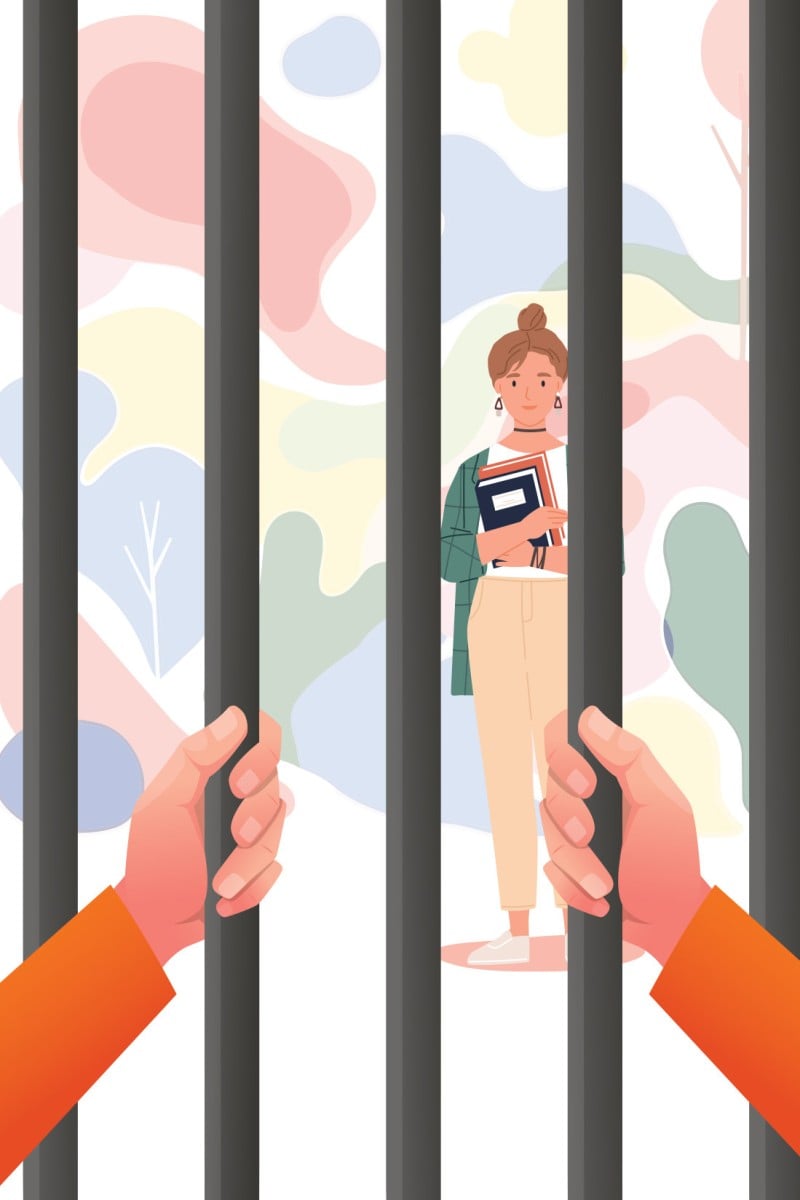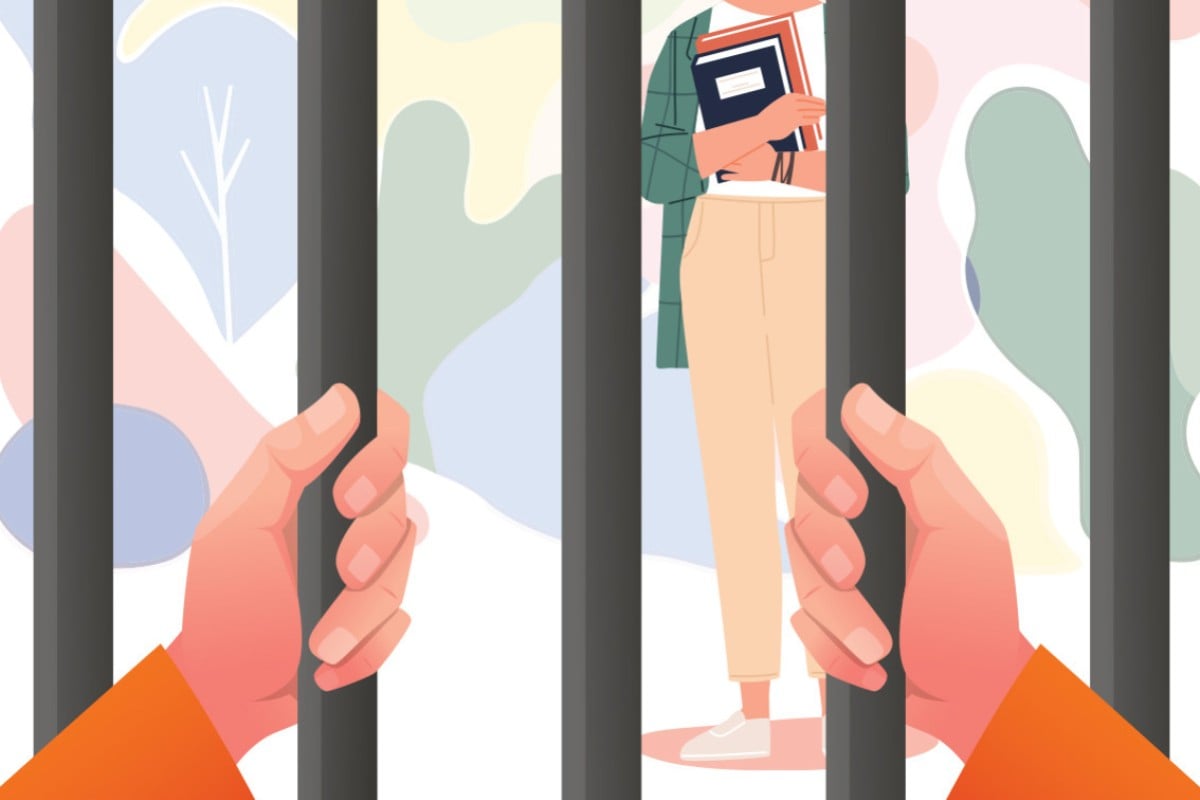
Young volunteers visit Hong Kong prisoners to give support as they seek a better life
The NGO Voice for Prisoners helps inmates access education and support from visitors, giving them hope for a brighter future
 Foreign inmates do not get many visitors, so the support from Voice for Prisoners is important for them. Graphic: Huy Truong
Foreign inmates do not get many visitors, so the support from Voice for Prisoners is important for them. Graphic: Huy TruongIn a prison visiting room, Lauren Chan, 17, hands Clara* a sketchbook. Their unlikely friendship was built through art, and it challenges stereotypes about prisoners in Hong Kong.
“I’m always super happy after I go visit [Clara]. She’s the nicest person ever,” Lauren said.
Lauren met Clara, who is in her twenties, while volunteering with a Hong Kong-based NGO, Voice for Prisoners. She visits Clara about once a week during school breaks.
A new perspective
Voice for Prisoners helps people who have been imprisoned for drug trafficking. The biggest punishment for drug trafficking is life in prison and a HK$5 million fine.
Many of those getting help from Voice for Prisoners are foreigners. The NGO helps organise visits and education programmes to help inmates cope with their challenges.
Jane Chow has worked at Voice for Prisoners for three years. She said that many “vulnerable” people were tricked into drug trafficking.
“[Traffickers say] ‘I’m going to fly you to Hong Kong, all expenses paid. You’re going to bring this [package] for me,’” she said.
By volunteering with the NGO, Lauren learned more about the lives of these prisoners. She was assigned to visit Clara, who has been in prison since last year.
Clara and her partner are from a country that is in a war. They struggled to make money to take care of their family, so they turned to drug trafficking. After they were arrested in Hong Kong, the couple pleaded guilty and are waiting for their sentencing.
Lauren said volunteering helped her realise that many people turn to crime because they have no other way to make money.
She hopes other kids challenge their beliefs by speaking to people with different experiences.
“Once you speak to them in person, face to face, you’re going to ... come out of that negative mindset,” she said.
Build a brighter future
Another volunteer is 21-year-old Anna Smirnova. She recently graduated from the Chinese University of Hong Kong, where she studied psychology.
Smirnova is originally from Russia. She was also assigned to visit Clara, since they speak the same language.
Though Smirnova recognised that any involvement with drugs was “a very serious offence”, she was surprised by how easy it was to connect with the prisoners.
“We actually became good friends, and we have a lot to talk about,” Smirnova said.
According to Smirnova, the prison provides basic supplies and a clean environment. But foreign inmates usually have fewer calls home and fewer visitors than local inmates.
“I definitely hear a lot of complaints about how depressed they are,” Smirnova said.
Spark Deep Dive: Hong Kong’s efforts to fight space oil’s rise in popularity
Even after being released from prison, Clara and her partner will have more challenges ahead.
“They will be deported to their home country by the Hong Kong government. Finding employment can be challenging for some due to their criminal records,” Chow said.
The NGO worker added that education was very important for helping inmates find other jobs and stay away from crime.
Voice for Prisoners works with four educational institutions in Hong Kong. They provide prisoners with short courses that teach skills for different jobs.
But student inmates often have no access to the internet or a computer. They must study on their own. Inmates also have to pay tuition fees, which can be expensive for them.
“Despite these obstacles, inmates ... put in tremendous effort to earn their degrees,” she said. “This initiative has fostered a stronger educational culture within prisons ... giving them hope for a brighter future.”
*Name changed at the request of Voice for Prisoners.
-
Reflect: What are your assumptions about prisoners?
-
Why this story matters: Human connection is important for everyone. Many people in prison want to make a change, but it can be hard when they do not have the resources to help with their goals.
deported 驅逐出境
to force somebody to leave a country, usually because they have broken the law or because they have no legal right to be there
inmates 囚犯
one of the people living in an institution such as a prison
obstacles 障礙
a situation that makes it difficult for you to do or achieve something
stereotypes 刻板印象
a fixed idea or image that many people have of a particular type of person or thing, but which is often not true in reality and may cause hurt and offence
trafficking 販運
the activity of buying and selling something illegally
Build your vocabulary skills
What obstacles do people face if they want to find a job after being in prison?
